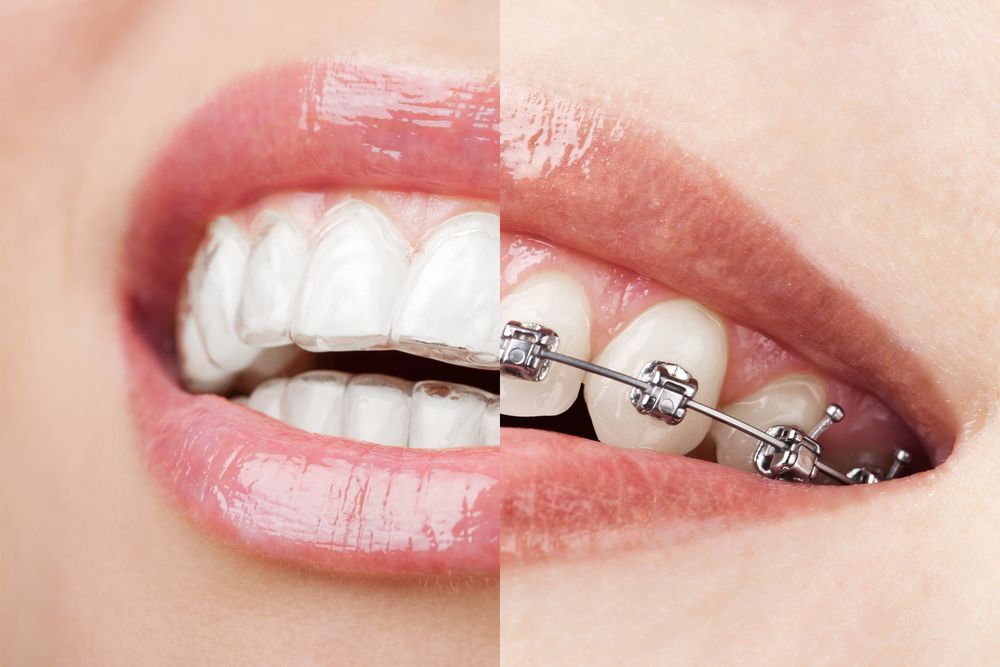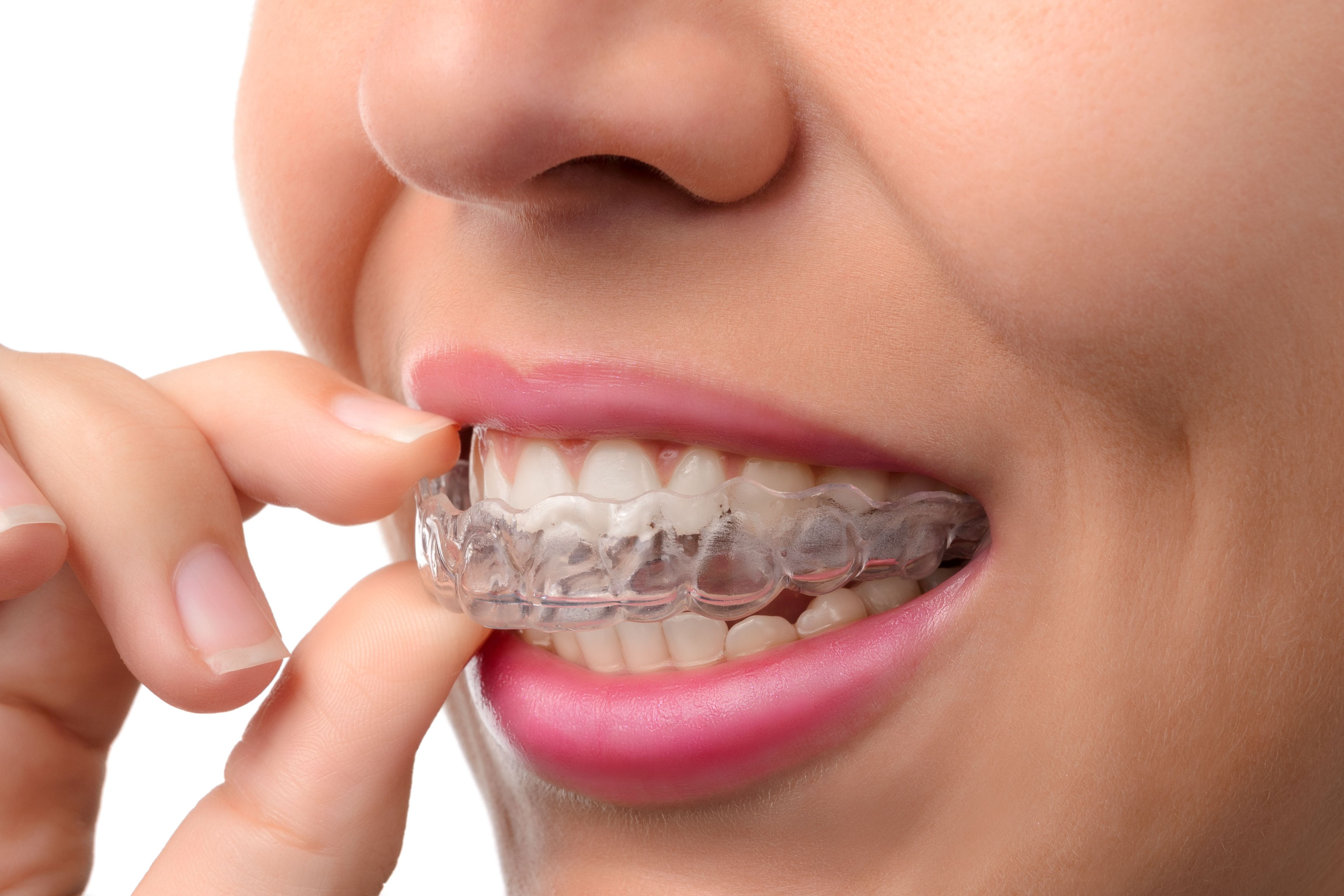Traditional Braces vs. Invisalign: Which Is Right for Me?

Misaligned teeth can impact the appearance of your smile, and they can also affect your oral health. Orthodontic treatments such as braces or clear aligners like Invisalign® can straighten your teeth for a more beautiful and healthy smile. But which is right for you? Learn how orthodontic treatment at my Cary, NC, dental practice can improve your oral health and appearance, and find out which option is best for you.
How Do Orthodontic Issues Impact Oral Health?
Crooked teeth may seem like just a cosmetic issue. However, even mild misalignment can cause a variety of oral health concerns. Crooked teeth or a misaligned bite can cause issues such as:
- Temporomandibular joint disorder - TMD is a condition in which the temporomandibular joint, or TMJ, can become painful and inflamed.
- Tooth decay - Crooked teeth can make it difficult to properly brush and floss. This can lead to tooth decay and infections in the mouth.
- Periodontal issues - Because crooked teeth can be difficult to brush properly and floss, you may be at an increased risk of developing periodontal concerns such as gingivitis or periodontitis.
- Tooth loss - Those with periodontal concerns or tooth decay are at risk of tooth loss.
- Pain - A misaligned bite can cause pain in the jaw and mouth.
While not everyone may experience issues with crooked teeth, by correcting the issue, I can prevent the development of these concerns later on.
Invisalign vs. Braces
Traditionally, orthodontic treatment involved metal wires and brackets to straighten your teeth.
Advancements in the field of orthodontics allow patients more options. Invisalign is one such alternative.
Instead of metal wires and brackets, Invisalign uses a series of smooth, clear aligner trays to gently guide your teeth into proper alignment.
Can Invisalign Correct the Same Issues as Braces?

The answer is: it depends. Invisalign can address a wide range of concerns, just like braces. However, clear aligners tend to be best for mild to moderate concerns. In some cases, Invisalign treatment can be paired with other treatment options, such as jaw surgery for more severe issues. Each person is unique, and in some cases, braces may be the better option to correct your issues.
Both Invisalign and braces can correct issues such as:
- Gapped teeth
- Rotated teeth
- Overcrowding
- Underbites
- Crossbites
- Overbites
During your consultation at my Cary dental practice, I will examine your mouth and discuss your goals and oral health history to customize a treatment plan to best address your issues.
Breaking Down the Differences
While both treatments can address a variety of orthodontic concerns, there are some key differences in treatment.
- Aligner Trays vs. Metal Brackets - Invisalign uses a series of removable aligner trays. With traditional braces, metal wires and brackets are adhered to the teeth. They will remain in place for the duration of treatment.
- Adjustments - Over the course of treatment with braces, I will adjust the metal wires in order to guide your teeth into alignment. With Invisalign, you will receive a series of trays. One will be worn for about four weeks before you will move to the next in the series. This works just like adjusting your braces, as both methods slowly guide your teeth into more appropriate alignment.
- Diet Restrictions - Traditional braces have some dietary restrictions that must be considered. During your treatment, it is best to avoid sticky foods like gum and caramel. You must also be mindful of hard foods that may cause your brackets and wires to become dislodged. Because Invisalign trays are removable, there are no dietary restrictions. You simply remove the trays to eat, rinse them, and return them to your mouth when you are finished eating.
- Time - On average, Invisalign treatment is faster than traditional braces. While this will vary depending on how severe your orthodontic issues are, Invisalign treatment can take as little as 12 to 18 months, whereas the average treatment with braces is approximately 24 months.
- Removable - While there are many benefits to removable aligner trays, patients must be responsible enough to wear them for 22 hours a day. They must also be responsible enough to not lose or damage their trays.
- Cleaning - Oral hygiene with braces is a little bit different than simply brushing your teeth. Patients with braces must be sure to brush around and between the brackets and wires to ensure that they are clean, and that plaque and food debris does not build up. With Invisalign trays, you will remove them and brush and floss as normal. Cleaning Invisalign trays is easy. Simply brush your trays with a mild soap and soft-bristled brush and rinse them with warm (not hot) water.
So Which is Right for Me?

Determining if braces or Invisalign is right for you depends on a variety of factors. You may be a good candidate for Invisalign if:
- Your orthodontic concerns are mild to moderate. Severe issues may be better addressed with traditional braces.
- You do not grind your teeth. Grinding can damage the aligner trays.
- You are in good oral health before treatment. You must be free of tooth decay and gum disease before you undergo Invisalign treatment. If you have any of these concerns, I offer comprehensive dental services to help you qualify for Invisalign treatment.
- You are responsible enough to maintain the aligners. If you cannot keep up with your trays or if you cannot dedicate yourself to wearing your Invisalign aligners for a minimum of 22 hours a day, traditional metal braces may be a better option for you.
- Still not sure? Take the Invisalign smile quiz.
Meet With a Dentist
Orthodontic treatment has a variety of benefits for your oral health as well as the appearance of your smile. Thanks to advancements in dentistry, patients have more options than ever. If you have crooked teeth or a misaligned bite or simply want to explore your orthodontic options further, the first step on your smile journey is to contact my dental practice in Cary, NC, to schedule a consultation. During that appointment, we can discuss your options before I develop a custom treatment plan to help you achieve the smile of your dreams.

About Jeffrey S. Kearney, DDS
A dentist since 1992, Dr. Jeffrey Kearney has extensive training in TMJ and sleep-breathing disorders. He is a member of the Academy of General Dentistry and a fellow of the American Academy of Craniofacial Pain and the International Congress of Oral Implantologists.
Read Dr. Kearney's Full Bio | All Posts by Jeffrey Kearney


